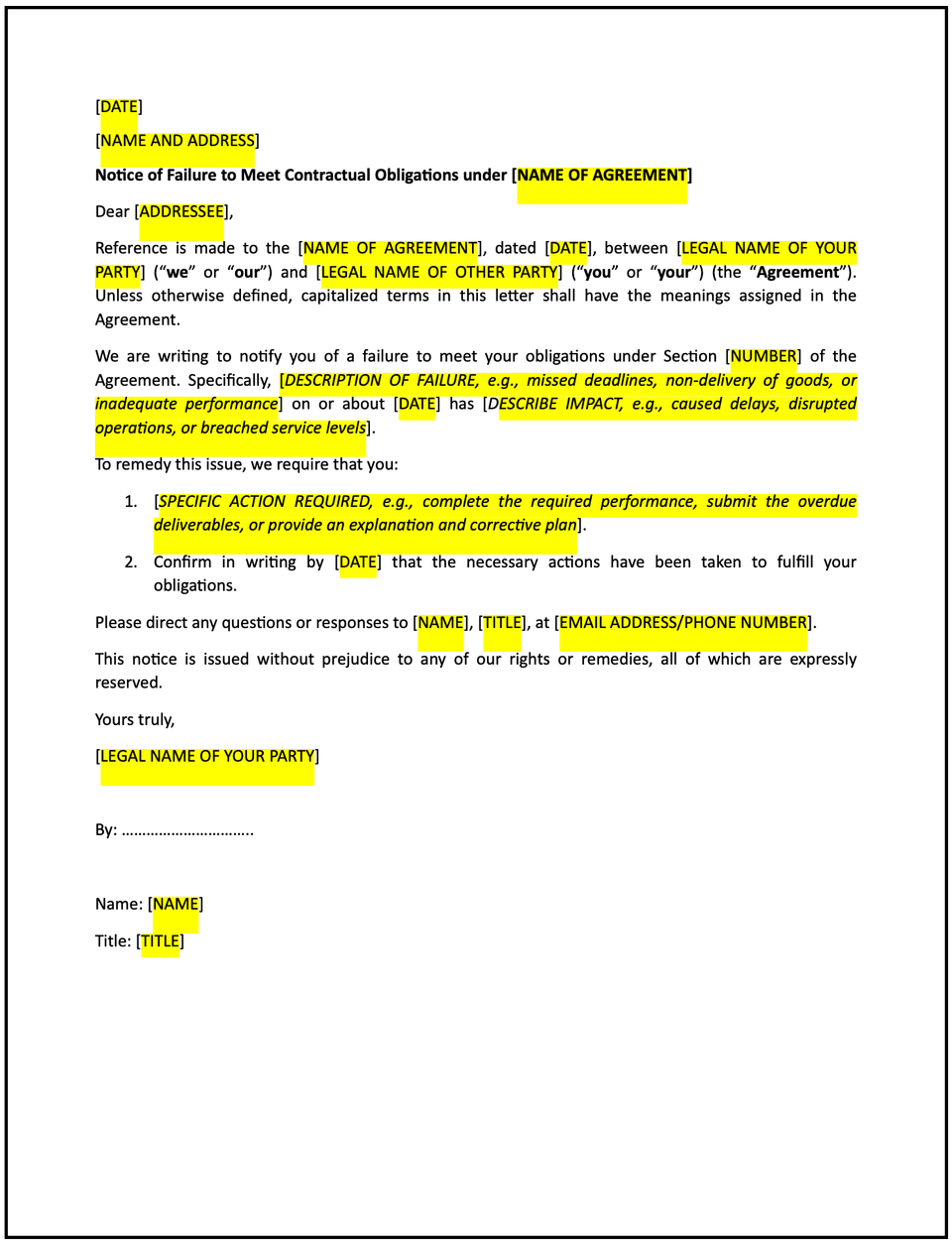Letter of failure to meet contractual obligations: Free template

Letter of failure to meet contractual obligations
Failure to meet contractual obligations can disrupt business operations and strain professional relationships. This letter provides a professional and constructive way to address the issue, remind the other party of their responsibilities, and propose steps to resolve the matter while maintaining a collaborative tone.
How to use this letter of failure to meet contractual obligations
- Reference the contract: Clearly identify the contract, including its title, reference number, and the parties involved. Specify the relevant clauses outlining the obligations.
- Customize the template: Replace placeholders with your organization’s details, the obligations that were not met, and the impact caused by the failure.
- Specify the failure: Clearly describe the obligations that were not fulfilled, including dates, deliverables, or actions that were due.
- Explain the impact: Provide a concise explanation of how the failure has affected your organization or the agreement’s execution.
- Propose corrective actions: Suggest specific steps or timelines for resolving the issue and fulfilling the obligations.
- Maintain a professional tone: Keep the letter respectful and solution-focused to preserve the business relationship.
- Request acknowledgment: Ask the other party to confirm receipt of the letter and provide a response to the proposed resolution.
Benefits of using a letter of failure to meet contractual obligations
This letter template provides a professional and constructive way to address contractual failures while maintaining clarity and accountability. Here’s how it helps:
- Address issues promptly: Raising the failure in a timely manner ensures it is addressed before causing further disruption.
- Reinforce accountability: Clearly outlining the obligations and the failure emphasizes the importance of meeting contractual commitments.
- Propose solutions: Suggesting corrective actions demonstrates your willingness to resolve the issue constructively.
- Minimize disputes: Addressing the failure professionally helps maintain a positive relationship and reduces the risk of escalation.
- Provide documentation: The letter serves as a formal record of the issue and your efforts to address it, which can be useful for future reference.
Tips for writing an effective letter of failure to meet contractual obligations
- Be specific: Clearly reference the contract and the obligations that were not met to avoid ambiguity.
- Explain the impact: Provide a factual explanation of how the failure has affected your organization or the agreement’s execution.
- Propose solutions: Suggest clear and actionable steps to address the failure and prevent recurrence.
- Use professional language: Maintain a respectful and solution-oriented tone, focusing on resolving the issue rather than assigning blame.
- Keep it concise: Focus on the key points and avoid unnecessary details that could detract from the main message.
Frequently asked questions (FAQs)
Q: What details should I include in this letter?
A: Include the contract reference, the specific obligations that were not met, the impact of the failure, and proposed corrective actions.
Q: Should I include evidence of the failure?
A: Yes, if possible, provide documentation such as timelines, communications, or reports to support your claim.
Q: Who should receive this letter?
A: Send the letter to the other party or parties involved in the contract, typically their legal or operational representatives.
Q: How formal should this letter be?
A: The tone should be professional and respectful, focusing on resolving the issue constructively while maintaining the relationship.
Q: When should this letter be sent?
A: Send the letter as soon as the failure is identified to address the issue promptly and minimize its impact.
Q: Can this letter address multiple failures?
A: Yes, but clearly outline each instance of failure and propose broader corrective actions to prevent future occurrences.
Q: Is this letter suitable for contracts still in effect?
A: Yes, this letter is appropriate for addressing failures in active contracts or agreements that were recently concluded.
This article contains general legal information and does not contain legal advice. Cobrief is not a law firm or a substitute for an attorney or law firm. The law is complex and changes often. For legal advice, please ask a lawyer.


